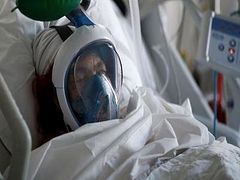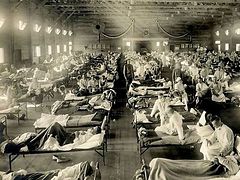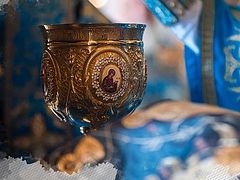Metropolitan Philaret (Kucherov) of Lviv is the head of the synodical department for health and medical issues of the Ukrainian Orthodox Church. His Eminence is highly qualified for this position, as he is able to speak not only as an Orthodox hierarch on issues of morals and medical ethics, but also as someone who studied in a medical university and worked in a hospital. We have previously included his directions, entitled, “Holy Communion is for the healing of soul and body, we cannot speculate or manipulate this”, in a compilation article of spiritual advice, from Ukrainian Hierarchs, on issues relating to the Coronavirus. As Vladyka Philaret was also a medical professional prior to his episcopate, he has a unique perspective on this issue.
“I’m sick with the Coronavirus. Is this a punishment from God? God sends us sickness to punish, so that we receive retribution for our sins—is this whole epidemic a punishment for us?”—Metropolitan Philaret of Lviv answers questions he received:
Illness is not a punishment. The Creator sends only goodness and love, He has no dark side, He never wishes man evil or ill. And sickness—sickness is a visitation of God, not a time to be punished as retribution. If God sends man sickness and suffering, it is only so that he may come to salvation.
Yes, for the sake of this most important goal—salvation—sometimes man must go through pain and tears. But remember: The Lord Himself voluntarily deigned to suffer for the salvation of the human race: by His wounds we are healed [Isa. 53:5].1 This means that God found a way to turn even suffering [which came into the world through man] into a means of salvation and purification, which will work for anyone who humbly and patiently trusts in His will. When a person suffers, he realizes how vain this life is and turns to God.
God teaches us to endure, teaches us to forgive, teaches us to hope. The task of a person in sorrows and trials is to realize his inner state, deeply analyze his life and find in it what needs to be changed. A person who works on himself, who is ready to bring forth repentance and purify himself, who loves others and does good deeds, begins to build his future life, while still here on earth. For such a person, without a doubt, suffering in this earthly world leads to eternal life.
On the one hand, the Lord Himself is experiencing suffering and sorrow, and on the other hand, He is showing us that He is here, with us in this moment. When human means are exhausted, an Orthodox Christian should remember that the power of God is manifested in [times of need, and] human weakness. (cf. 2 Cor. 12:9)2
It is in the depths of suffering that the human soul is able to meet with Christ, Who suffered for us, and who took upon Himself our sorrows and sufferings. (See: Isa. 53:4)3
Of course, it happens that people live happily without all these sufferings and trials, but this does not mean that God has left them. Many people live righteously; and perhaps a happy life is God's answer. But God does not leave us, we leave God. St. John Chrysostom says that it is not correct to think that the sun hides from a blind man; man by nature cannot see the sun's rays, just as it is not true to say that God turns away from man—it is man himself who turns his back on God and, like the blind man, he does not see him, and sometimes does not even feel the warmth of His Divine Light.
Yes, we all have different paths to salvation—some through suffering, some through happiness. The main thing is that we do not flee from the path on which the Lord leads us.




